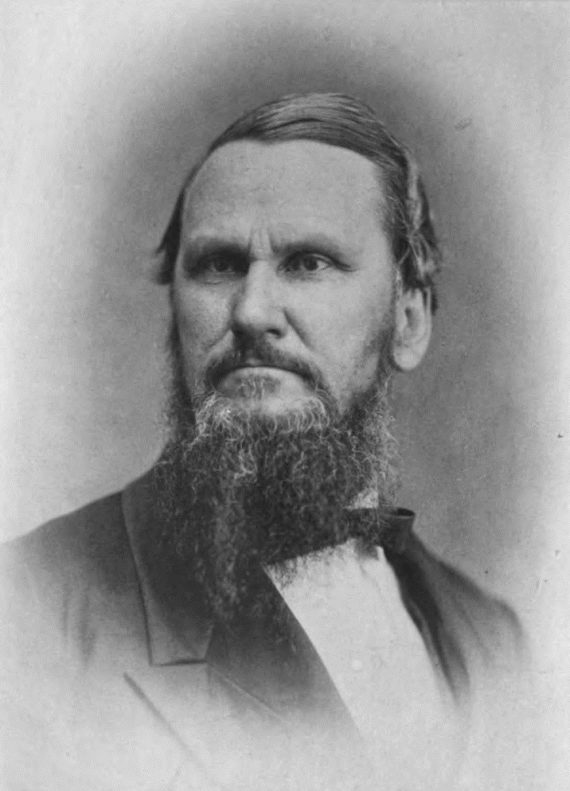A number of years ago I became interested in the writings of the great Southern author and philosopher Robert Lewis Dabney (d. 1898). Dabney, if he is much known at all these days, is famous because he was chaplain to Confederate general, Thomas “Stonewall” Jackson, and because he penned a Life of General Thomas J. Jackson (1866) and then for his famous apologia for the old South, A Defense of Virginia, and Through Her, of the South (1867). The great Southern scholar Richard Weaver discusses Dabney briefly in his masterful volume, The Southern Tradition at Bay (edited and published in 1968, and republished since then), and it is there that more recent interest in Dabney has its origin.
During my graduate studies at the University of Virginia I prepared a paper on Dabney; and since then, I have re-written it and had it published several times in different publications and in different formats. It has seen the light of day in the old Southern Partisan magazine, in The Southern Mercury, on the Communities Digital News web site, at The Unz Review, and most recently, on The Abbeville Institute.
In it, I spend some time examining Dabney’s withering criticism of public education and the public schools—that was back in the 1880s! And, I also delve into his well-developed criticisms of triumphant industrial capitalism and its effects on the American republic. Except for Henry and Brooks Adams, and perhaps a few other less well-known writers, I know of no other more formidable and perceptive critic of the path the American nation was taking after the defeat of the Southern Confederacy and, thus, after the defeat of the older Constitutional system as envisaged by the American Founders.
But 1865 did not just signal the victory of a more centralized, Hamiltonian conception of the American union, the decline of states’ rights, and the triumph of an impersonal international capitalism, increasingly concentrated in a few hands. It meant that our national narrative—our national mindset—now was also transformed; the views that possessed the Founders and that were considered standard and normative through much of the first eighty years of our republic, were now consigned to those “bitter Southern apologists” or to those “reactionary and sentimental writers” who somehow “refused to understand and accept Progress.”
Dabney was a noted “old school” Presbyterian minister and professor, and before the War Between the States had gained some justified fame as a preacher and theologian. But, by far, it was his reflections and commentaries after the War, even during the years after the end of Reconstruction, that have more significance for those of us today.
Substantial portions of Dabney’s critiques address the idea of “equality” as contained in the Declaration of Independence, and the then-current issue of women’s suffrage. In my paper I did not address these topics to any great degree; indeed, I re-discovered those arguments more recently after re-reading a volume of Dabney’s complete works, the volume titled Secular Discussions. Therein, the Old School Calvinist makes a powerful case against broadening the suffrage, but, in so doing, he brings to bear an even more forceful and powerful argument against the “egalitarian” idea, itself, which supposedly comes to us, handed down from the American Founders and, of course, supposedly is contained in the Declaration of Independence.
I don’t know if the late Professor Mel Bradford had read Dabney. As he was one of the editors of Weaver’s posthumous volume, I suspect he may have been familiar with Dabney’s writings. Nevertheless, Bradford’s famous and long essay “The Heresy of Equality,” published by the Modern Age quarterly in 1976, underlines some of the major themes in Dabney’s critique of late 19th century egalitarianism. For it was not just “women’s suffrage” that Dabney was assailing in his finely-honed arguments, but the dominant egalitarian narrative that had, in a real and practical sense, triumphed on the battlefield in 1865 and that had supplanted the older vision of the Founders.
And more recently, scholar Barry Shain has amassed overwhelming documentation demonstrating, in many ways, that the views of Bradford and Dabney, their interpretations of the Declaration of Independence, and their understanding of “equality,” are much closer to those of the Founders and the Framers.
I would note one more element in Dabney’s essays. What he has to say about the constant retreating and cowardice of supposed “conservatives,” and, in particular, his understanding that an intellectual infection—the Idea of Progress—had taken hold, even of those who professed to be our champions and defenders, plumb the depths of our modern-day situation and intellectual confusion. His comments, while aimed at the partisans of equality of 130 years ago, have an even deeper resonance for those of us living in the 21st century. In a word, he seems to be asking us, across the ages: “How can you combat your enemies, political, cultural, and religious, if you employ their language and accept in effect their goals?”
It is a question that today’s dominant “conservative movement” [i.e., Neonconservatism] avoids, because most of its leaders and publicists wallow in that “slough of despond,” that intellectual bog created, fomented, and propagated by our enemies. They, indeed, accept the linguistic norms and most of the eventual goals of the progressivists, even while suggesting that they have a much better way of arriving at those very same goals.
Until we renounce that progressivist language and those goals, we remain prisoners of the progressivist historical template.
In the final years of the 19th century, Robert Lewis Dabney understood that essential fact as perhaps no other American writer has done since then, at least until more recently, and the critiques of Bradford, Samuel Francis and Paul Gottfried. To challenge the dominant template, to even meekly suggest that it leads to eventual surrender and defeat, is to endanger one’s career as a “conservative” and to get you banned from “movement” publications or on-air interviews on Fox, or condemned as a “racist,” “white supremacist,” “Neo-Confederate,” ”homophobe,” and much worse.
That is the price dissenters must pay, just as Dabney, appalled by what he perceived as theological heresy by fellow Presbyterians and the acquiescence by many of his fellow Virginians in the dominant “New South” progressivist creed, fled to Texas for the final years of his life.
But that is the price to pay for preaching truth to power, and despite its hardships and inconveniences, for those dedicated to its significance and its vitality—and to those abiding principles that never grow old or die—it is worth it.
A couple of years ago I shared Dabney’s passages with writer and columnist Pat Buchanan, who was so impressed by them, that he quoted portions in one of his nationally syndicated columns. My hope is that Dabney’s works may be better known and more widely diffused among a newer generation that has witnessed the failures not only of the Managerial State, but also of the ineffectual modern conservative movement.
Here, then, are three passages that I found incredibly impressive and prescient:
—————————————————————————————————-
“The very axioms of American politics now are, that “all men are by nature equal,” that all are inalienably “entitled to liberty and the pursuit of happiness,” and that “the only just foundation of government is in the consent of the governed.” There was a sense in which our fathers propounded these statements; but it is not the one in which they are now held by Americans. Our recent doctors of political science have retained these formularies of words as convenient masks under which to circulate a set of totally different, and indeed antagonistic notions; and they have succeeded perfectly. The new meanings of which the “Whigs” of 1776 never dreamed are now the current ones. Those wise statesmen meant to teach that all men are morally equal in the sense of the Golden Rule: that while individual traits, rights, and duties vary widely in the different orders of political society, these different rights all have some moral basis; that the inferior has the same moral title (that of a common humanity and common relation to a benignant Heavenly Father) to have his rights—the rights of an inferior—duly respected, which the superior has to claim that his very different rights shall be respected.
The modern version is that there are no superiors or inferiors in society; that there is a mechanical equality; that all have specifically all the same rights; and that any other constitution is against natural justice. Next: when our wise fathers said that liberty is an inalienable, natural right, they meant by each one’s liberty the privilege to do such things as he, with his particular relations, ought to have a moral title to do; the particular things having righteous, natural limitations in every case, and much narrower limits in some cases than in others.
Radical America now means by natural liberty each one’s privilege to do what he chooses to do. By the consent of the governed our forefathers meant each Sovereign Commonwealth’s consenting to the constitution under which it should be governed: they meant that it was unjust for Britain to govern America without America’s consent. Which part of the human beings living in a given American State should constitute the State potentially, the populus whose franchise it was to express the will of the commonwealth for all—that was in their eyes wholly another question, to be wisely decided in different States according to the structure which Providence had given them. By “the consent of the governed” it would appeal that Radicalism means it is entirely just for Yankeedom to govern Virginia against Virginia’s consent, and that it is not just to govern any individual human being without letting him vote for his governors. The utter inconsistency of the two parts of this creed, is not ours to reconcile. It is certain that, both parts (consistent or not) are firmly held as the American creed.
The version given to the maxim as to individual rights is universally this: that natural justice requires that suffrage shall be-coextensive with allegiance except where the right has been forfeited by some crime (such as that which the men of 1861 committed in presuming to act on the principles of the men of 1776). To these errors the American people are too deeply committed to evade any of their logical applications.”
+++++++++++++++++++++++++++++++++++++++++++++++++++++++++++++++++++
“…[We] must teach, with Moses, the Apostle Paul, John Hampden, Washington, George Mason, John C. Calhoun, and all that contemptible rabble of “old fogies,” that political society is composed of “superiors, inferiors, and equals”; that while all these bear an equitable moral relation to each other, they have very different natural rights and duties; that just government is not founded on the consent of the individuals governed, but on the ordinance of God, and hence a share in the ruling franchise is not a natural right at all, but a privilege to be bestowed according to a wise discretion on a limited class having qualification to use it for the good of the whole; that the integers out of which the State is constituted are not individuals, but families represented in their parental heads; that every human being is born under authority (parental and civic) instead of being born “free” in the licentious sense that liberty is each one’s privilege of doing what he chooses; that subordination, and not that license, is the natural state of all men; and that without such equitable distribution of different duties and rights among the classes naturally differing in condition, and subordination of some to others, and of all to the law, society is as impossible as is the existence of a house without distinction between the foundation stone and the cap-stones.”
+++++++++++++++++++++++++++++++++++++++++++++++++++++++++++++++++++
“It may be inferred again that the present movement for women’s rights, will certainly prevail from the history of its only opponent, Northern conservatism. This is a party which never conserves anything. Its history has been that it demurs to each aggression of the progressive party, and aims to save its credit by a respectable amount of growling, but always acquiesces at last in the innovation. What was the resisted novelty of yesterday is to-day one of the accepted principles of conservatism; it is now conservative only in affecting to resist the next innovation, which will to-morrow be forced upon its timidity, and will be succeeded by some third revolution, to be denounced and then adopted in its turn. American conservatism is merely the shadow that follows Radicalism as it moves forward towards perdition. It remains behind it, but never retards it, and always advances near its leader. This pretended salt hath utterly lost its savor: wherewith shall it he salted? Its impotency is not hard, indeed, to explain. It is worthless because it is the conservatism of expediency only, and not of sturdy principle. It intends to risk nothing serious, for the sake of the truth, and has no idea of being guilty of the folly of martyrdom. It always—when about to enter a protest—very blandly informs the wild beast whose path it essays to stop, that its “bark is worse than its bite,” and that it only means to save its manners by enacting its decent rôle of resistance. The only practical purpose which it now subserves in American politics is to give enough exercise to Radicalism to keep it “in wind,” and to prevent its becoming pursy and lazy from having nothing to whip. No doubt, after a few years, when women’s suffrage shall have become an accomplished fact, conservatism will tacitly admit it into its creed, and thenceforward plume itself upon its wise firmness in opposing with similar weapons the extreme of baby suffrage; and when that too shall have been won, it will be heard declaring that the integrity of the American Constitution requires at least the refusal of suffrage to asses. There it will assume, with great dignity, its final position.”
From: Robert Lewis Dabney, “Womens’ Rights Women” (from his Secular Discussions, pp. 491-493)








9 Comments